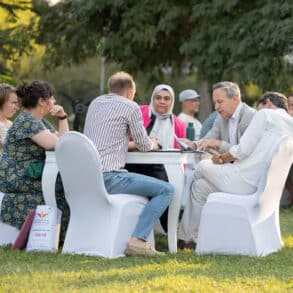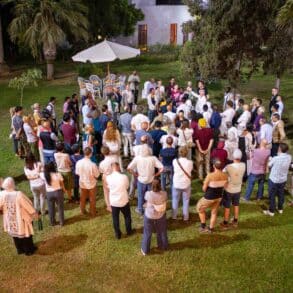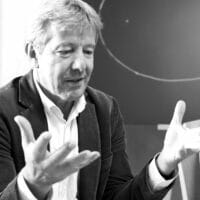On the third morning of the World Conference, Christiane Haid and Wolfgang Tomaschitz undertook an exploration of the realm of the “human head”, of thinking, in the form of a probing dialogue.
Christiane Haid began the conversation by drawing attention to a characteristic of the head region: stillness. The head is indeed the least moving part of the human organism; this stillness can also be found in the consciousness, in the inner life, in the thought life.
Coldness of Consciousness
Wolfgang Tomaschitz then drew attention to the “coldness” of this pole of consciousness. “The consciousness soul is this entity in us that can assure itself of itself, that insists on clarity and alertness. It is cool, cold in its beginnings. Coldness here means that we adopt the position of an observer, that we establish an ideal of objectivity. And that is incredibly valuable.” Nevertheless, this objectivity, in its coldness, in its abstractness, would freeze and starve the soul. That is why warmth has to be found here. Christiane Haid then asked how we could engage with this cold, still space in order to escape from abstraction and enter into an experience, an inner perception. How can sensitivity and will become effective here?
“I believe that cognitive practice is the answer,” said Tomaschitz. However, it’s not about exploring large, complex concepts but, firstly, about observing ourselves: “What do I actually know at all about my very simple cognitive manoeuvres? How do I form a concept? How do I direct a thought?” And where does the state of wakefulness come from? What produces it? Quoting philosopher Dieter Henrich, Tomaschitz believes that perhaps we are not the producers of this state of wakefulness but, on the contrary: “Wakefulness is, rather, something that has access to us.”
Meditative Warmth
To get closer to the life of thoughts, Christiane Haid asked: “What is stillness of thought? Is it thoughts that are at rest? Does the thinking rest? Does thinking enter into a context in which stillness arises? Or do I have to get myself into a state of mind that is inwardly so still that another side of thinking can emerge?” It is about creating moments of stillness in which the thinking focuses its attention on one concept, concentrates entirely on certain words, certain ideas, such as the combination of words “ground of eternity” [Ewigkeitsgründe]. “Ground” and “eternity”: we can inwardly “rest on a word, first on one, then on the other, then on their consonance. It is about resting with our thinking on them for a longer period of time. In doing so, we become inwardly still and contemplate the word so that it can begin to express itself within us. We notice that we are moving inwardly in a space that is very different from the one we normally inhabit.” This is how Haid described a meditative quality that can occur and develop in the thought process.
“Thinking and thoughts are already accessible to us. It is fundamental,” Tomaschitz continued. In observing what is happening here, it was not particularly necessary to search for higher worlds that transcend us but to discover something that is very close to us: “Something elemental, something that underlies the cognitive manoeuvres of everyday consciousness.” An intimate experience that may appear insignificant but has great significance. According to Tomaschitz, this experience also shows us the difference between our human experience of thinking and its potential, and what we find in artificial intelligence. At this point, Haid pointed out that the new “intelligent” machines acutely raise the question of what we really are as “human beings”.
The Call of the World
As the discussion revolved around the concepts of freedom and dignity, a paradox of our time gradually became clear: the ideals at the heart of our civilisation are not so easy to grasp conceptually. “How do we know that all people are equal in terms of their dignity? It is not something we can tell from empirical evidence,” Tomaschitz stated. “The substance of concepts can scarcely be grasped with today’s intellectuality. Today, The Philosophy of Freedom has to be rewritten in the face of this issue, which the thinkers, the contemporary philosophers and social philosophers who are awake, see. But this is precisely where a huge difficulty arises, because we can no longer really get to the inner content of our constitutional texts in terms of thinking and cognition. That’s tricky.”
This probing and dialogue-based exploration made clear how much contemporary civilisation challenges us: the ideals we think we lean on are actually not that robust. In order to really take root, ideals and values need an intensification of thinking activity, a culture of a contemplative quality in the thinking, in order to move beyond abstraction into a world in which ideas are experienced and perceived: a thinking that beholds and experiences in the stellar realm of ideas.
Translation Christian von Arnim
Title image Goetheanum World Conference 2023; Photo: Xue Li









